On July 30, President Donald Trump said he was willing to meet with Iranian leaders anytime with no preconditions. “If we could work something out that’s meaningful, not the waste of paper that the other [Iran nuclear] deal was, I would certainly be willing to meet,” he said at a joint press conference with Italy’s prime minister. The following are excerpted remarks by Trump and reactions from Iran.
Q: Thank you, Mr. President. You spoke a bit about Iran today and your discussions, and I’m wondering if you could tell us what you think Iran needs to do to reduce some of the tensions. And you’ve met with the leaders of North Korea and Russia. Are you prepared also — are you willing to meet with President Rouhani? And under what conditions? And have there been any preliminary discussions about something like that?
Trump: I’ll meet with anybody. I believe in meeting. The Prime Minister said it better than anybody can say it: Speaking to other people, especially when you’re talking about potentials of war and death and famine and lots of other things — you meet. There’s nothing wrong with meeting. We met, as you know, with Chairman Kim. And it — you haven’t had a missile fired off in nine months. We got our prisoners back. So many things have happened. So positive.
But meeting with people — I had a great meeting, in my opinion. Of course, the fake news didn’t cover it that way. But I had a great meeting with President Putin of Russia. I think it was a great meeting. In terms of the future, in terms of safety and economic development and protecting Israel and protecting everybody, I thought it was a great meeting.
Great meeting with NATO. I just explained NATO. I just explained NATO. Hundreds of billions of dollars more money will be paid into NATO, the coffers of NATO. And much already has.
So I believe in meeting. I would certainly meet with Iran if they wanted to meet. I don’t know that they’re ready yet. They’re having a hard time right now.
But I ended the Iran deal; it was a ridiculous deal. I do believe that they will probably end up wanting to meet, and I’m ready to meet any time they want to. And I don’t do that from strength or from weakness. I think it’s an appropriate thing to do. If we could work something out that’s meaningful, not the waste of paper that the other deal was, I would certainly be willing to meet.
Q: Do you have preconditions for that meeting?
Trump: No preconditions. No. If they want to meet, I’ll meet. Anytime they want. Anytime they want. It’s good for the country, good for them, good for us, and good for the world. No preconditions. If they want to meet, I’ll meet.
Iranian Reaction
Foreign Minister Mohammad Javad Zarif
Iran & US had 2 yrs of talks. With EU/E3+Russia+China, we produced a unique multilateral accord—the JCPOA. It’s been working. US can only blame itself for pulling out & leaving the table. Threats, sanctions & PR stunts won’t work. Try respect: for Iranians & for int'l commitments
— Javad Zarif (@JZarif) July 31, 2018
Foreign Ministry Spokesman Bahram Ghassemi
“With current America and these policies, there will definitely not be the possibility of dialogue and engagement, and the United States has shown that it is totally unreliable.”
“Given the current circumstances and hostile actions of the United States, the country’s withdrawal from the JCPOA and continuation of hostile policies, its efforts to put economic pressure on the Iranian people and its sanctions, I think there are no conditions for such a discussion at all.”
“America’s hostile policies against Iran continue, and Iran has prepared itself for this behavior, doing what it takes to thwart these conspiracies and hostile policies.”
—July 30, 2018, to the press
Major General Mohammad Ali Jafari, Commander of the Islamic Revolutionary Guard Corps
“Mr. Trump! Iran is not North Korea to accept your offer for a meeting.”
“Even U.S. presidents after you will not see that day.”
—July 31, 2018, according to Fars News Agency via Reuters
Ali Akbar Nategh Nouri, Expediency Council Member
“It should be discussed in the Supreme National Security Council."
"We have to contemplate" Trump’s remarks, but “we should not rejoice over this offer and not get excited.”
“Trump may take advantage of this over-excitement.”
“It could be a test for us.”
—July 31, 2018, according IRNA via the Associated Press
Ali Motahari, Deputy Speaker of Parliament
Negotiating with the United States now "would be a humiliation."
"If Trump had not withdrawn from the nuclear deal and not imposed (new) sanctions on Iran, there would be no problem with negotiations with America.”
—July 31, 2018, to IRNA via Reuters
Heshmatollah Falahatpisheh, head of Parliament’s national security and foreign policy committee
“There can be no negotiations with the Americans raising the issue of talks from the position of power.”
—July 31, 2018, according to Parliament’s website via the Associated Press
Interior Minister Abdolreza Rahmani Fazli
“The United States is not trustworthy. How can we trust this country when it withdraws unilaterally from the nuclear deal?”
—July 31, 2018, according to Fars News Agency via Reuters
Hamid Aboutalebi, Advisor to President Hassan Rouhani
BREAKING:
— Negar (@NegarMortazavi) July 30, 2018
Iranian President‘s advisor @DrAboutalebi reacts to Trump. He says if you want to negotiate you must also commit to its tools which include respecting the Iranian people, reducing animosity, and returning to the Iran Nuclear Deal, in order to pave the way for a meeting.
Reformist Member of Parliament Mostafa Kavakebian
“If this negotiation (is) carried out in any form, then it will be considered as surrender, and the Iranian nation will not surrender.”
—July 31, 2018, according to the Associated Press
August 1, 2018 Newspaper Front Pages
Ebtekar
"Drums of War, Songs of Negotiation"
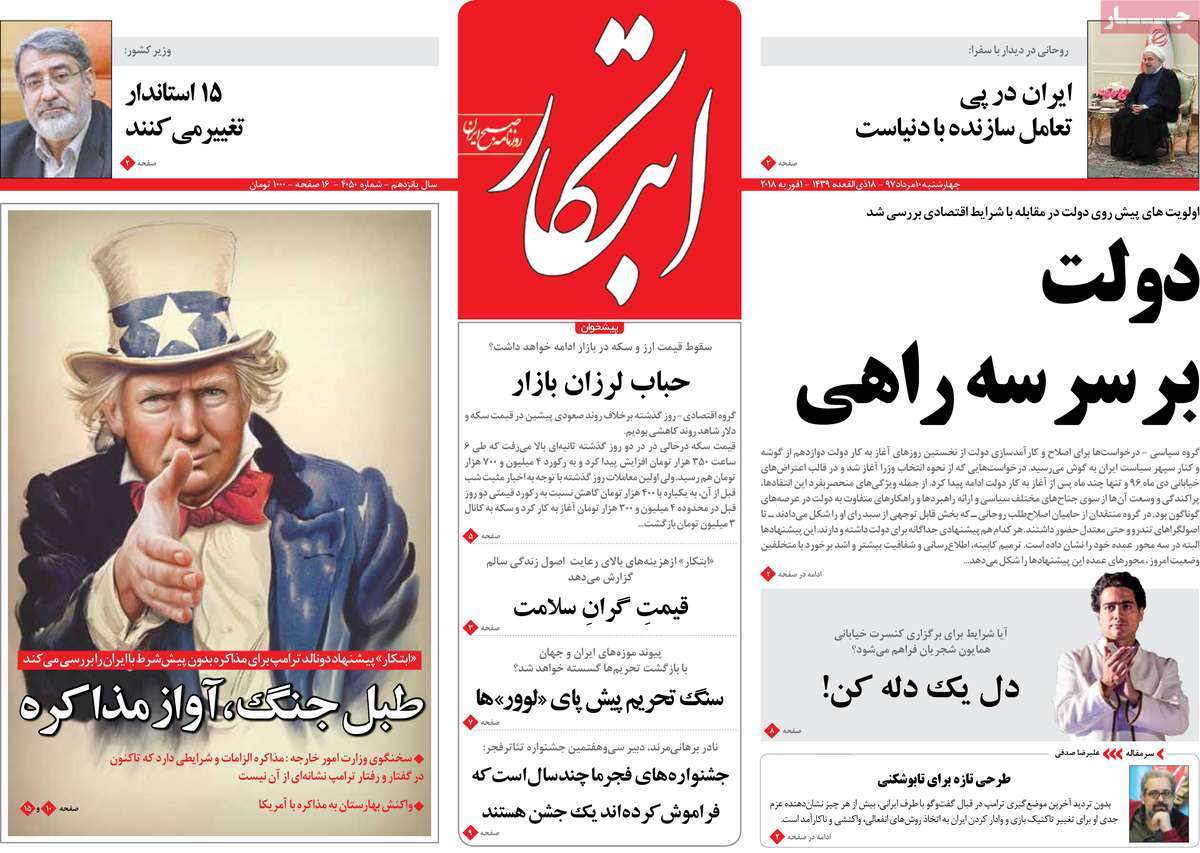
Javan
"Gambler Playing with Negotiation"
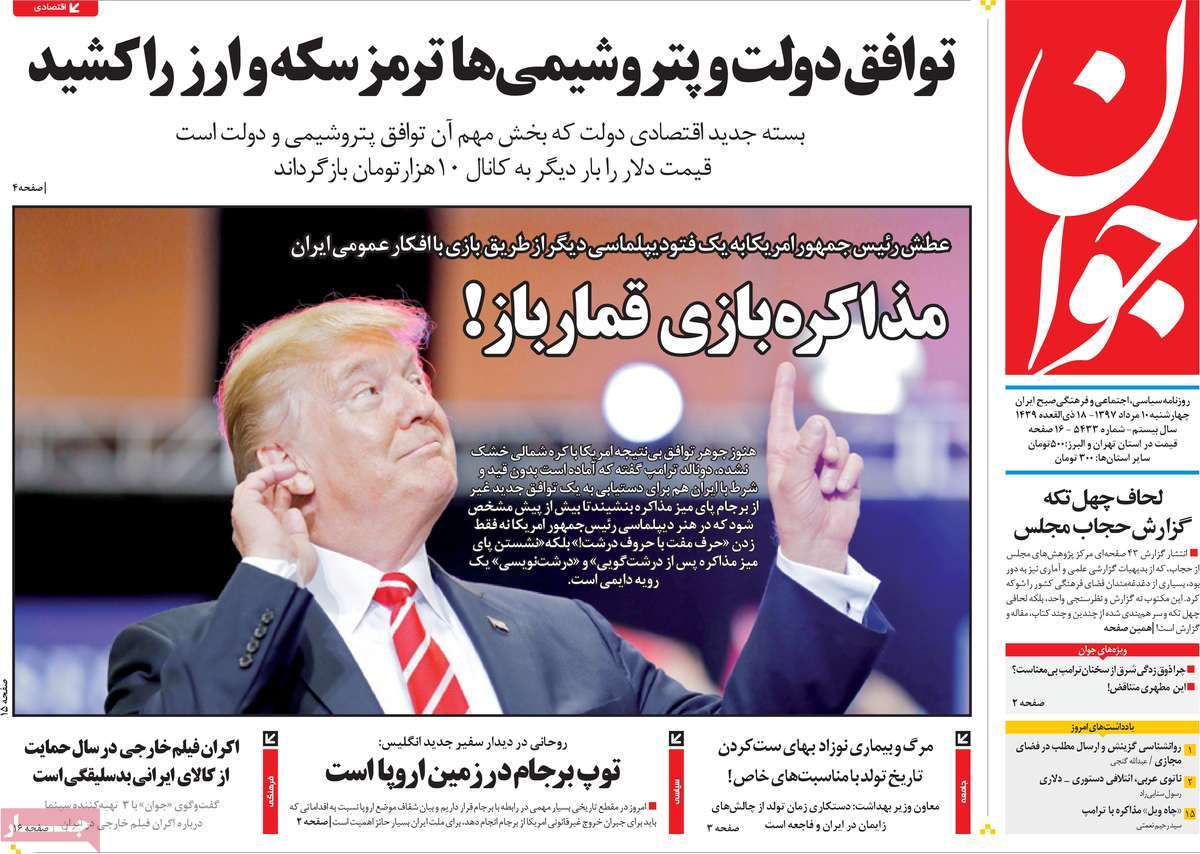
Afkar
"U.S. Sending Mixed Signals to Iran"
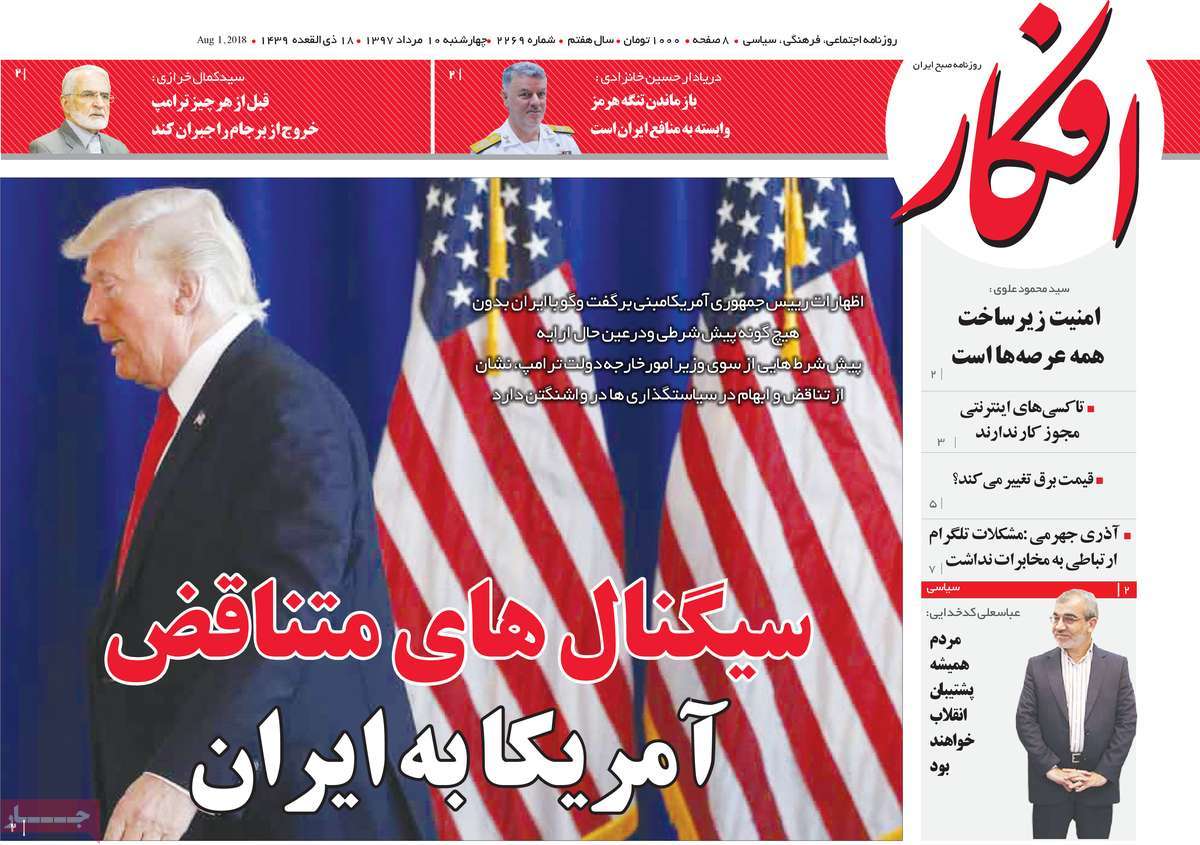
Sazandegi
"Trump, One Step Back"
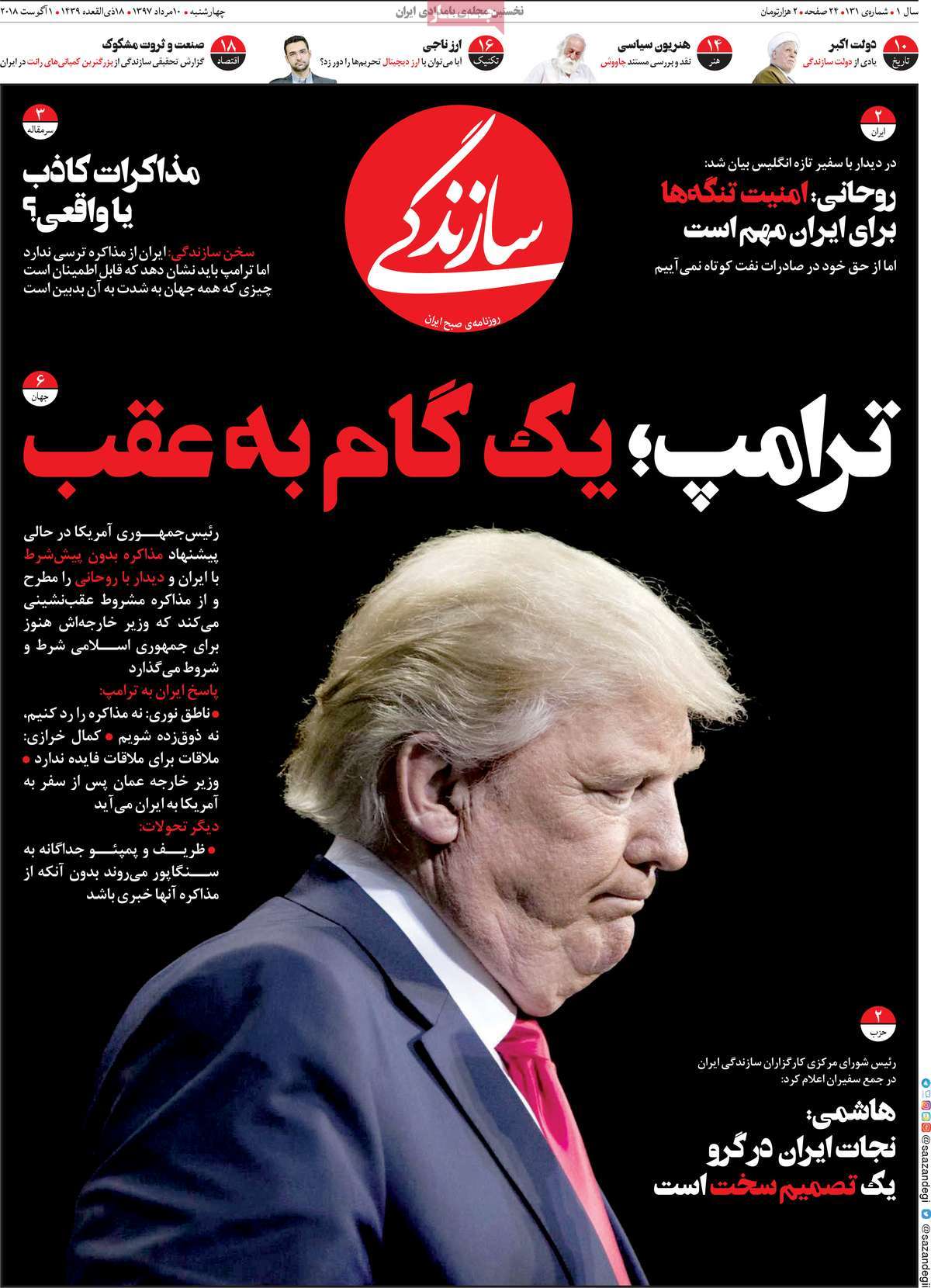
Setraeh Sobh
"Negotiation with Iran without Any Preconditions"
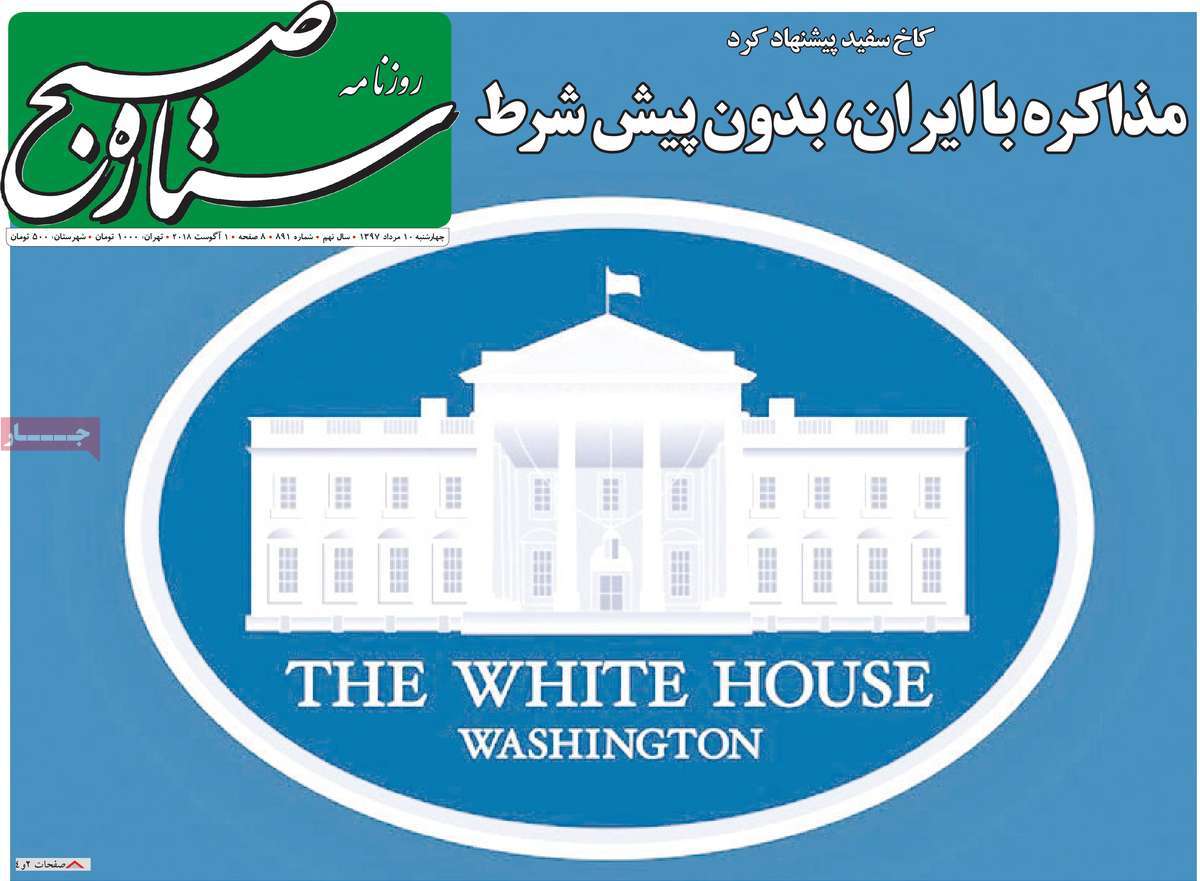
Arman-e Emrooz
"Iran-U.S.: The Great Negotiation?"
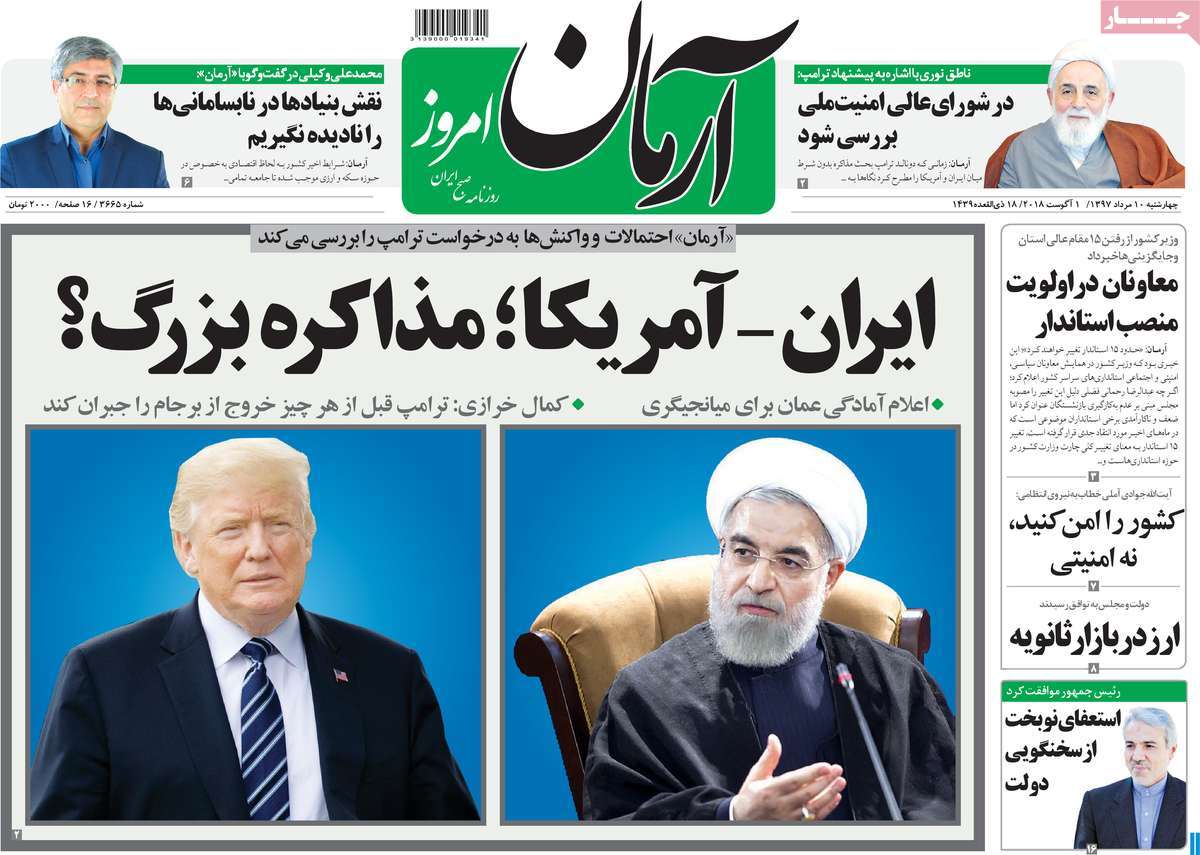
*Headline translations via Iran Front Page
Trump’s remark came just a week after he and President Hassan Rouhani traded barbs. Rouhani had warned against taking hostile actions toward Iran, and Trump responded with a tweet that triggered strong reactions in Tehran.
To Iranian President Rouhani: NEVER, EVER THREATEN THE UNITED STATES AGAIN OR YOU WILL SUFFER CONSEQUENCES THE LIKES OF WHICH FEW THROUGHOUT HISTORY HAVE EVER SUFFERED BEFORE. WE ARE NO LONGER A COUNTRY THAT WILL STAND FOR YOUR DEMENTED WORDS OF VIOLENCE & DEATH. BE CAUTIOUS!
— Donald J. Trump (@realDonaldTrump) July 23, 2018
Iranian Foreign Minister Mohammad Javad Zarif responded with his own tweet.
COLOR US UNIMPRESSED: The world heard even harsher bluster a few months ago. And Iranians have heard them —albeit more civilized ones—for 40 yrs. We’ve been around for millennia & seen fall of empires, incl our own, which lasted more than the life of some countries. BE CAUTIOUS!
— Javad Zarif (@JZarif) July 23, 2018
Secretary of Defense James Mattis
Trump’s comments came just days after the Australian Broadcasting Cooperation reported that senior Australian officials thought the United States was preparing to bomb Iranian nuclear facilities, perhaps as early as August. On the following day, Secretary of Defense James Mattis called the report “fiction,” but he criticized Iran for exporting instability across the Middle East. Iran “has to start living by the international rules,” he said. The following are excerpted remarks by Mattis.
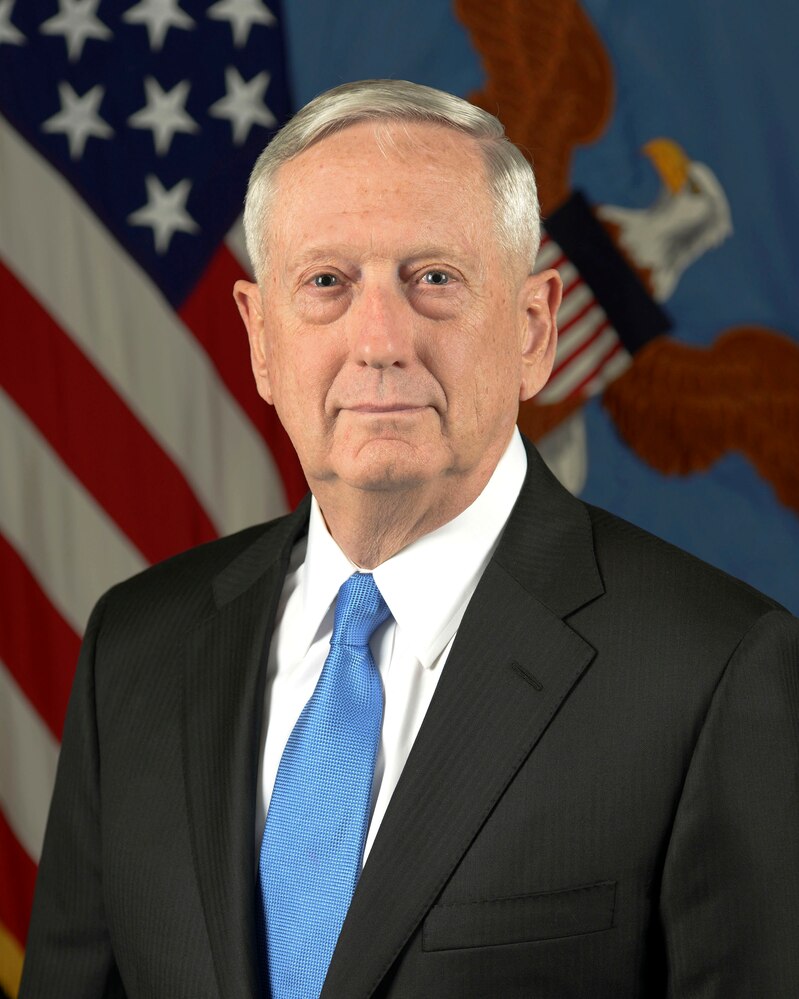
Q: The Australian officials have said they're concerned that the U.S. is preparing air strikes and -- or military strikes against Iran next month. Can you assure the American people that the U.S. is not preparing military strikes against Iran?
SEC. MATTIS: I have no idea where the Australian news people got that information. I'm confident it is not something that's being considered right now, and I think it's a complete – frankly, it's – it’s fiction. It's the best I can give you, Jennifer.
Press Gaggle at the Pentagon
Q: On Iran, you've now seen the Iranian-backed Houthis attack oil shipping off of Yemen. It seems like it might be a test of chokepoint operations by the Iranians. Tell people, if you can explain, what your current level of concern is about Iranian rhetoric about trying to potentially shut oil shipping in the Persian Gulf. If the Australian report is wrong, fine, but that doesn't really take away the Iranian threat that you might be looking at, and your concern about it. So can you talk to us about that?
SEC. MATTIS: Yeah. Iran has threatened to close the Strait of Hormuz. They've done that previously in years past. They saw the international community put -- dozens of nations of the international community put their naval forces in for exercises to clear the straits. Clearly, this would be an attack on international shipping, and -- and it would have, obviously, an international response to reopen the shipping lanes with whatever that took, because of the world's economy depends on that energy, those energy supplies flowing out of there.
But Iran has simply got to find that it's got a better path forward for its people by not being the one to export insecurity. They've got to start living by the international rules, and we all know what they've done to keep Assad in power. We all know what they've done to provide missiles and other support to the -- the Houthi -- to the civil war in Yemen, to one side of the civil war in Yemen. And I can go on -- what they're doing to destabilize Bahrain, what they're doing in Lebanon -- I mean, this is -- this is all well-known, so I don't need to reiterate it. They are the exporter of instability across the region.
